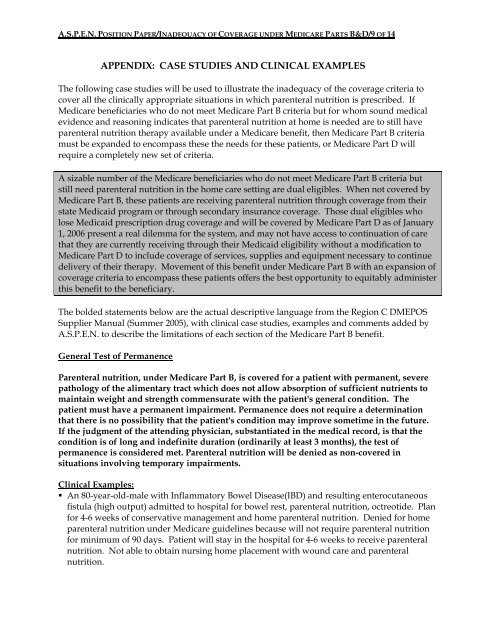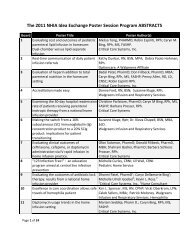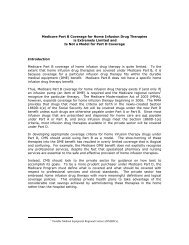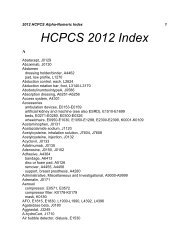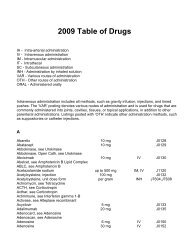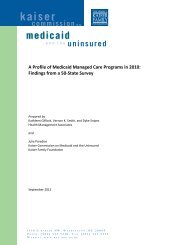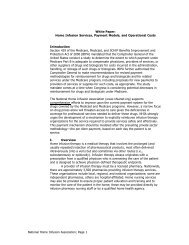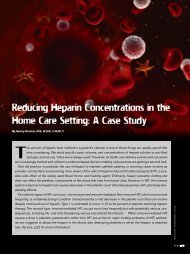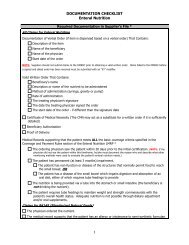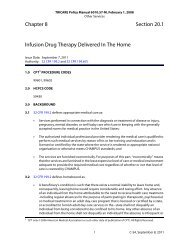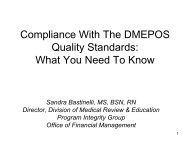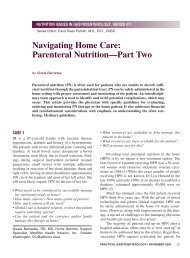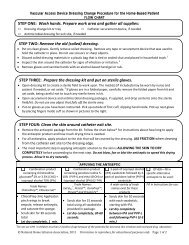Inadequacy of Coverage Under Medicare Part B and - NHIA
Inadequacy of Coverage Under Medicare Part B and - NHIA
Inadequacy of Coverage Under Medicare Part B and - NHIA
You also want an ePaper? Increase the reach of your titles
YUMPU automatically turns print PDFs into web optimized ePapers that Google loves.
A.S.P.E.N. POSITION PAPER/INADEQUACY OF COVERAGE UNDER MEDICARE PARTS B&D/9 OF 14<br />
APPENDIX: CASE STUDIES AND CLINICAL EXAMPLES<br />
The following case studies will be used to illustrate the inadequacy <strong>of</strong> the coverage criteria to<br />
cover all the clinically appropriate situations in which parenteral nutrition is prescribed. If<br />
<strong>Medicare</strong> beneficiaries who do not meet <strong>Medicare</strong> <strong>Part</strong> B criteria but for whom sound medical<br />
evidence <strong>and</strong> reasoning indicates that parenteral nutrition at home is needed are to still have<br />
parenteral nutrition therapy available under a <strong>Medicare</strong> benefit, then <strong>Medicare</strong> <strong>Part</strong> B criteria<br />
must be exp<strong>and</strong>ed to encompass these the needs for these patients, or <strong>Medicare</strong> <strong>Part</strong> D will<br />
require a completely new set <strong>of</strong> criteria.<br />
A sizable number <strong>of</strong> the <strong>Medicare</strong> beneficiaries who do not meet <strong>Medicare</strong> <strong>Part</strong> B criteria but<br />
still need parenteral nutrition in the home care setting are dual eligibles. When not covered by<br />
<strong>Medicare</strong> <strong>Part</strong> B, these patients are receiving parenteral nutrition through coverage from their<br />
state Medicaid program or through secondary insurance coverage. Those dual eligibles who<br />
lose Medicaid prescription drug coverage <strong>and</strong> will be covered by <strong>Medicare</strong> <strong>Part</strong> D as <strong>of</strong> January<br />
1, 2006 present a real dilemma for the system, <strong>and</strong> may not have access to continuation <strong>of</strong> care<br />
that they are currently receiving through their Medicaid eligibility without a modification to<br />
<strong>Medicare</strong> <strong>Part</strong> D to include coverage <strong>of</strong> services, supplies <strong>and</strong> equipment necessary to continue<br />
delivery <strong>of</strong> their therapy. Movement <strong>of</strong> this benefit under <strong>Medicare</strong> <strong>Part</strong> B with an expansion <strong>of</strong><br />
coverage criteria to encompass these patients <strong>of</strong>fers the best opportunity to equitably administer<br />
this benefit to the beneficiary.<br />
The bolded statements below are the actual descriptive language from the Region C DMEPOS<br />
Supplier Manual (Summer 2005), with clinical case studies, examples <strong>and</strong> comments added by<br />
A.S.P.E.N. to describe the limitations <strong>of</strong> each section <strong>of</strong> the <strong>Medicare</strong> <strong>Part</strong> B benefit.<br />
General Test <strong>of</strong> Permanence<br />
Parenteral nutrition, under <strong>Medicare</strong> <strong>Part</strong> B, is covered for a patient with permanent, severe<br />
pathology <strong>of</strong> the alimentary tract which does not allow absorption <strong>of</strong> sufficient nutrients to<br />
maintain weight <strong>and</strong> strength commensurate with the patient's general condition. The<br />
patient must have a permanent impairment. Permanence does not require a determination<br />
that there is no possibility that the patient's condition may improve sometime in the future.<br />
If the judgment <strong>of</strong> the attending physician, substantiated in the medical record, is that the<br />
condition is <strong>of</strong> long <strong>and</strong> indefinite duration (ordinarily at least 3 months), the test <strong>of</strong><br />
permanence is considered met. Parenteral nutrition will be denied as non-covered in<br />
situations involving temporary impairments.<br />
Clinical Examples:<br />
• An 80-year-old-male with Inflammatory Bowel Disease(IBD) <strong>and</strong> resulting enterocutaneous<br />
fistula (high output) admitted to hospital for bowel rest, parenteral nutrition, octreotide. Plan<br />
for 4-6 weeks <strong>of</strong> conservative management <strong>and</strong> home parenteral nutrition. Denied for home<br />
parenteral nutrition under <strong>Medicare</strong> guidelines because will not require parenteral nutrition<br />
for minimum <strong>of</strong> 90 days. Patient will stay in the hospital for 4-6 weeks to receive parenteral<br />
nutrition. Not able to obtain nursing home placement with wound care <strong>and</strong> parenteral<br />
nutrition.


